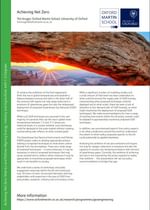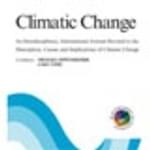New Year's Honour for Professor Myles Allen
Professor Myles Allen has been named among seven members of the University of Oxford who have been recognised for their outstanding achievements in the New Year's Honours list for 2022.

The Oxford Martin Programme on Geoengineering was established in 2010 and concluded in 2022. The following page is an archived resource.

The Oxford Geoengineering Programme seeks to engage with society about the issues associated with geoengineering and conduct research into some of the proposed techniques.
Geoengineering is the deliberate, large-scale intervention in the Earth’s natural systems to address climate change. Although we believe that society’s first priority should be to reduce global carbon emissions, in dealing with climate change it may be wise to consider geoengineering the climate to reduce the harmful levels of carbon dioxide in the atmosphere.
The programme does not advocate implementing geoengineering, but it does advocate conducting research into the social, ethical and technical aspects of geoengineering. This research must be conducted in a transparent and socially informed manner.
Our programme is a unique partnership that includes engineers, natural scientists and experts in governance to focus equally on robust science and thoroughly considered ethics. A core component of our activity includes engagement with policy makers, opinion formers and environmental NGOs to build a collaborative and multi-perspective platform for open debate.

The “Oxford Principles” are a proposed set of initial guiding principles for the governance of geoengineering.
While the involvement of the private sector in the delivery of a geoengineering technique should not be prohibited, and may indeed be encouraged to ensure that deployment of a suitable technique can be effected in a timely and efficient manner, regulation of such techniques should be undertaken in the public interest by the appropriate bodies at the state and/or international levels.
Wherever possible, those conducting geoengineering research should be required to notify, consult, and ideally obtain the prior informed consent of, those affected by the research activities. The identity of affected parties will be dependent on the specific technique which is being researched – for example, a technique which captures carbon dioxide from the air and geologically sequesters it within the territory of a single state will likely require consultation and agreement only at the national or local level, while a technique which involves changing the albedo of the planet by injecting aerosols into the stratosphere will likely require global agreement.
There should be complete disclosure of research plans and open publication of results in order to facilitate better understanding of the risks and to reassure the public as to the integrity of the process. It is essential that the results of all research, including negative results, be made publicly available.
An assessment of the impacts of geoengineering research should be conducted by a body independent of those undertaking the research; where techniques are likely to have trans-boundary impact, such assessment should be carried out through the appropriate regional and/or international bodies. Assessments should address both the environmental and socio-economic impacts of research, including mitigating the risks of lock-in to particular technologies or vested interests.
Any decisions with respect to deployment should only be taken with robust governance structures already in place, using existing rules and institutions wherever possible.
Professor Myles Allen has been named among seven members of the University of Oxford who have been recognised for their outstanding achievements in the New Year's Honours list for 2022.
The Oxford Net Zero initiative draws on the university’s world-leading expertise in climate science and policy, addressing the critical issue of how to reach global ‘net zero’ – limiting greenhouse gases – in time to halt global warming.
Next year will see an alignment of three of the big planetary bodies of diplomatic summitry – the UNFCCC’s Conference of the Parties (COP26), the G7 and the G20.
Professor Steve Rayner, James Martin Professor of Science and Civilization and Lead Researcher on three current Oxford Martin School programmes, has been announced as the winner of the 2020 Paradigm Award by the Breakthrough Institute.
Professor Gideon Henderson has been appointed by the Department for Environment, Food and Rural Affairs (Defra) to be the department’s new Chief Scientific Adviser.
Climate experts and economists at the Oxford Martin School have welcomed the Prime Minister’s announcement today that the UK will eradicate its net contribution to climate change by 2050.

Achieving Net Zero: Metrics and Policies Aligning Energy, Industry and Agriculture with 1.5 Degrees

Climate science: Stratospheric folly

The Oxford Principles

Process Safety and Environmental Protection

The Regulation of Geoengineering

Government Response to the House of Commons Science and Technology Committee 5th Report of Session 2009-10: The Regulation of Geoengineering

Memorandum on the role of the private sector in geoengineering. House of Commons Science and Technology Committee enquiry into The Regulation of Geoengineering

Memorandum on draft principles for the conduct of geoengineering research
If you found this page useful, sign up to our monthly digest of the latest news and events
Subscribe